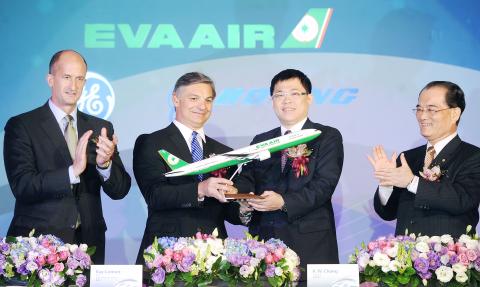EVA Airways Corp (EVA, 長榮航空), the nation’s second-largest airline, yesterday announced plans to add seven more of Boeing Co’s 777-300ER aircraft to its fleet to replace its B747-series airplanes and pursue greater energy efficiency.
The air carrier signed a US$930 million contract with Boeing to purchase three new B777-300ERs and inked an agreement to lease the remaining four planes from GE Capital Aviation Services Ltd, a commercial aircraft financing and leasing unit of General Electric Corp.
Deliveries are set to start in June 2014 and be completed by June 2016.

Photo: Liao Chen-huei, Taipei Times
“Deployment of the additional seven of these aircraft and gradual replacement of our other aircraft types will standardize our fleet and give us greater operational flexibility,” EVA president Chang Kuo-wei (張國煒) said at the signing ceremony.
EVA is a launch customer for the B777-300ER, Chang said. The air carrier operates 15 B777-300ER aircraft on its long-haul routes.
Compared with the B747-series aircraft, the B777-300ER consumes 22 percent less fuel, reduces carbon dioxide emissions by 22 percent and costs up to 20 percent less to operate, Chang said, citing analyses from Boeing.
Following the delivery of the new aircraft, EVA will gradually replace the operations of its B747 series fleet, Chang said, adding that the introduction of new planes will improve the company’s profitability.
Other than passenger jets, EVA will also move ahead with its plans to purchase cargo freighters after seeing some recovery in the cargo business, to replace its old cargo aircraft, Chang said.
EVA has so far divested itself of two of its six MD-series freighters this year and is expected to sell the other four by the end of this year.
Although the price of Brent crude oil fell 5.28 percent to US$113.18 a barrel at the Monday close from a week earlier, the airline sector continues to face the challenge of high jet fuel prices this year, which dragged down carriers’ profitability in the first quarter.
Aviation fuel prices may not reflect a recent downturn in crude oil prices right away, as it is set according to the average crude oil price from the previous month, Chang said.
However, Chang said the company is confident it would return to profit in the third quarter on the back of seasonal demand in the passenger business and will make efforts to break even for the first half of the year.
EVA reported NT$1.08 billion (US$36.77 million), or NT$0.33 per share, in net losses for the first quarter of the year, company financial data showed.
Meanwhile, Chang said he expects crude oil prices to continue their drop in the long term amid an increase in demand for alternative energy sources and falling demand for oil.
“In my opinion, a reasonable crude oil price is expected to fall at least to the level of US$80 a barrel,” Chang said.

RUN IT BACK: A succesful first project working with hyperscalers to design chips encouraged MediaTek to start a second project, aiming to hit stride in 2028 MediaTek Inc (聯發科), the world’s biggest smartphone chip supplier, yesterday said it is engaging a second hyperscaler to help design artificial intelligence (AI) accelerators used in data centers following a similar project expected to generate revenue streams soon. The first AI accelerator project is to bring in US$1 billion revenue next year and several billion US dollars more in 2027, MediaTek chief executive officer Rick Tsai (蔡力行) told a virtual investor conference yesterday. The second AI accelerator project is expected to contribute to revenue beginning in 2028, Tsai said. MediaTek yesterday raised its revenue forecast for the global AI accelerator used

Taiwan Semiconductor Manufacturing Co (TSMC, 台積電) has secured three construction permits for its plan to build a state-of-the-art A14 wafer fab in Taichung, and is likely to start construction soon, the Central Taiwan Science Park Bureau said yesterday. Speaking with CNA, Wang Chun-chieh (王俊傑), deputy director general of the science park bureau, said the world’s largest contract chipmaker has received three construction permits — one to build a fab to roll out sophisticated chips, another to build a central utility plant to provide water and electricity for the facility and the other to build three office buildings. With the three permits, TSMC

The DBS Foundation yesterday announced the launch of two flagship programs, “Silver Motion” and “Happier Caregiver, Healthier Seniors,” in partnership with CCILU Ltd, Hondao Senior Citizens’ Welfare Foundation and the Garden of Hope Foundation to help Taiwan face the challenges of a rapidly aging population. The foundation said it would invest S$4.91 million (US$3.8 million) over three years to foster inclusion and resilience in an aging society. “Aging may bring challenges, but it also brings opportunities. With many Asian markets rapidly becoming super-aged, the DBS Foundation is working with a regional ecosystem of like-minded partners across the private, public and people sectors

BREAKTHROUGH TECH: Powertech expects its fan-out PLP system to become mainstream, saying it can offer three-times greater production throughput Chip packaging service provider Powertech Technology Inc (力成科技) plans to more than double its capital expenditures next year to more than NT$40 billion (US$1.31 billion) as demand for its new panel-level packaging (PLP) technology, primarily used in chips for artificial intelligence (AI) applications, has greatly exceeded what it can supply. A significant portion of the budget, about US$1 billion, would be earmarked for fan-out PLP technology, Powertech told investors yesterday. Its heavy investment in fan-out PLP technology over the past 10 years is expected to bear fruit in 2027 after the technology enters volume production, it said, adding that the tech would